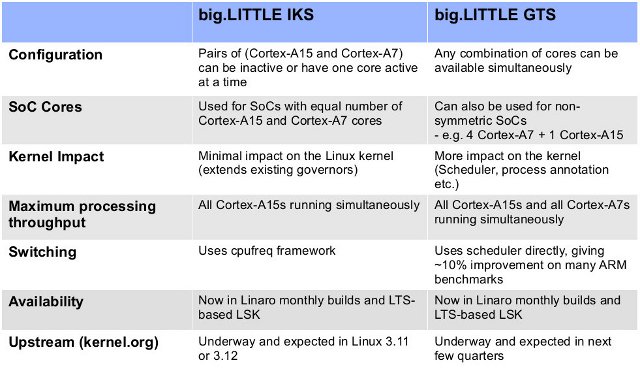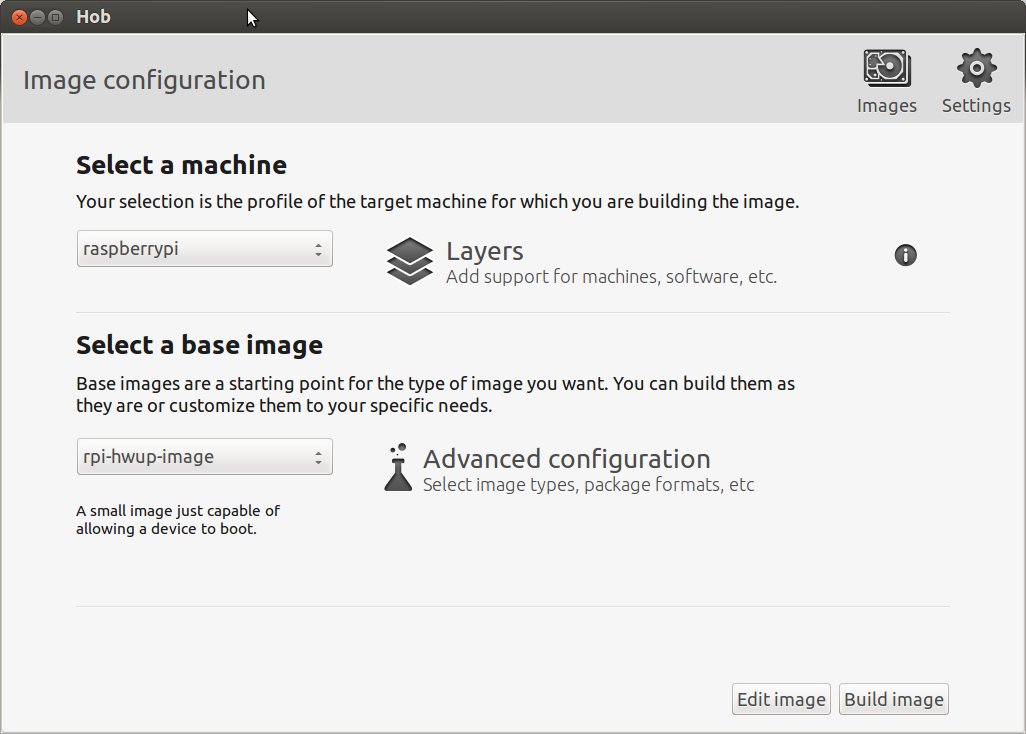Companies like Freescale and Texas Instruments provide good software support, and documentation, which is why they can be found in many embedded devices, because without documentation or source code low-level customization is nearly impossible or extremely time consuming. They also usually open most of the documentation and code, because they understand this can foster the use of their chips. On the other hand, Chinese-based SoC manufacturers focus on high-volume platforms such as tablets and smartphones, and usually management don’t understand the advantage to make documentation and GPL source code available, or even may consider it bad for business. Some individuals and small companies do not see it that way however, and they either want to access to the source code to improve existing mobiles devices, or use low cost Chinese SoCs to provide highly customizable hardware and software solutions. So source code and documentation have started to leak, and tools […]
big.LITTLE Processing Update – In-Kernel Switcher vs Global Task Scheduling
big.LITTLE processing is a new technology announced by ARM in 2011 that allows an SoC to feature low power cores (e.g. Cortex A7) together with high performance cores (e.g. Cortex A15) in order to optimize power consumption. I’ve previously detailed two big.LITTLE software implementation methods: In-kernel switcher which runs tasks on either Cortex A7 or Cortex A15 depending on the load, but both processors can not run simultaneously. Heterogeneous multiprocessing (now called Global Task Scheduling) that assigns tasks to relevant Cortex A7 or Cortex A15 cores, and if needed, allows all cores to run at the same time. Linaro has just provided a update for the big.LITTLE software implementation. There are currently only two SoCs that ship in products with Linaro b.L kernel support: ARM’s reference Test Chip 2 (TC2) tile for the Versatile Express development platform, configured as an SoC with 2 Cortex-A15 cores and 3 Cortex-A7 cores. Samsung-LSI’s […]
Linaro Connect Europe 2013 Sessions and Mini-Summit
Linaro Connect Europe 2013 (LCE13) is taking place in Dublin, Ireland on July 8 – 12, 2013. If you are not there, you can still follow the event remotely as the event schedule is available with tracks focused on Android, Builds and Baselines, Enterprise, Graphics and Multimedia, Linux Kernel, Network, Project Management Tools and Training, and the Testing and Validation mini-summit will also take place at the same time. There will be hacking and lab sessions each day (except on Friday) where you can expect to learn useful skills. I’ve selected 2 sessions per day that I think might be particularly interesting. Monday 10:00 – 10:45 – ARMv8 Status and Updates Current Status of v8 tree What’s merged? What’s features are next priorities? Platform Updates What members should know about adding new v8 platforms 12:00 – 13:00 – How to make Android more efficient for entry level products The main objective of […]
12MB Minimal Image for Raspberry Pi using the Yocto Project
Last year, I wrote instructions and provided a download link about a minimal image for Raspberry Pi based on Raspbian. The compressed image is 84MB, and the good thing about it is that you can just use apt-get to install packages. The problem is that it’s not actually that small as once it is uncompressed the rootfs is still a massive 414 MB. So today, I’ll explain how to create a smaller (and custom) image using the Yocto Project, a platform that let you build an embedded Linux distribution matching exactly your project’s requirements. Other advantages are that the build is configurable with config files, so it’s easily reproducible with a few command lines, and it might turn out to be useful to learn more about the Yocto Project as many boards and SoC are now making use of the framework, including Freescale i.MX6 (Wandboard, Olinuxino-imx233, Sabrelite, etc…), the Beagleboard, […]
Linux Kernel 3.10 Released
Linus Torvalds has announced the release of Linux Kernel 3.10: So I delayed this by a day, considering whether to do another -rc, but decided that there wasn’t enough upside. Sure, it hasn’t been as quiet as I’d like, and we had this long discussion about an inode list locking scalability issue over the last week or two, but in the end that issue turned out to not be new, and while we may end up back-porting the eventual resolution to 3.10, it wasn’t a reason to delay the release. Similarly, while I might wish for fewer pull requests during the late rc’s (and particularly the ones that came in Friday evening -inconvenient for a weekend release), at some point delaying things doesn’t really help things, and just makes the pent up demand for the next merge window worse. In other words, I could really have gone either way, but […]
Linaro 13.06 Release With Linux Kernel 3.10 and Android 4.2.2
Linaro 13.06 has been released with Linux Kernel 3.10-rc6 and Android 4.2.2. Linux Linaro Stable (LSK) preview is based on kernel 3.9.6. There seems to have been a lot of activity for the LAVA and Builds and Integration teams, with LAVA support for new SoC such as Huawei K3V2 and Broadcom Capri from 2 companies which have recently joined Linaro as members, and well as continuous build for Linaro Stable Kernel. On the kernel side, more work has been done for multi-platform support (unified kernel), uprobes, eMMC power mamangement, and more. Here are the highlights of this release: LAVA LAVA Core As part of the effort to improve the developer experience with LAVA, the different client tools were consolidated into a single package, which simplifies the process of updating the tools and makes it easier for the team to provide new features for LAVA users. LAVA now supports KVM devices, […]
Rockchip RK3066 is Now Part of Mainline Linux Kernel
After AllWinner A10/A13 SoCs, it’s time for another Chinese SoC to be included into mainline kernel, with Rockchip RK3066(a). A few hours ago, Heiko Stuebner’s commit for basic support in Linux kernel 3.11 has been accepted. This is the commit message: This adds a generic devicetree board file and a dtsi for boards based on the RK3066a SoCs from Rockchip. Apart from the generic parts (gic, clocks, pinctrl) the only components currently supported are the timers, uarts and mmc ports (all DesignWare- based). Don’t get too excited though, as it may take a little while until you can actually build a kernel for Rockchip RK3066 or AllWinner A10 from mainline linux source code. But this is definitely another step in the right direction, and hopefully, Chinese SoC companies will eventually get involved, instead of relying on the community, as it is in their best interest. To access the full list […]
Ubuntu 12.04 Now Boots on Rockchip RK3188 mini PCs (T428, MK908, Rikomagic MK802 IV…)
After the release of the RK3188 Linux kernel source code last week, Ian Morrison (Linuxium) has managed to boot Ubuntu 12.04 with XFCE desktop on Tronsmart T428. However, as Tronsmart refused to release their source code, further Linux development is likely to happen on Rikomagic MK802 IV, because Rikomagic released the code for their device, so development work will be easier. AFAIK, this is the first time Linux boots natively on RK3188 devices, so it’s still early stage (no Wi-Fi, Bt or graphics acceleration), but if you still want to give it a try here are the instructions (for T428):] Create a SDCARD with an Ubuntu 12.04 root file system on it and ensure it is labeled as “linuxroot” (Visit Slatedroid for details) Flash your RK3188 minipc with rooted stock 4.1.1 ROM. (May not be needed if you ROM is already rooted) Boot Android, and install Android Terminal Flash t428-3.0.36-linuxium-test+-kernel.img […]








